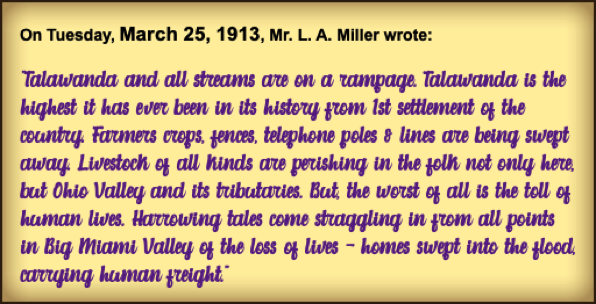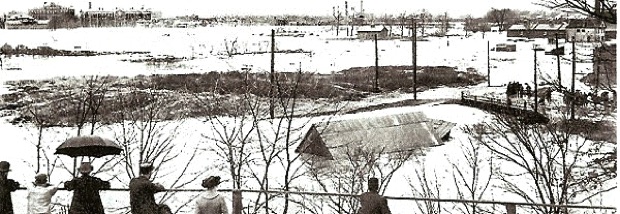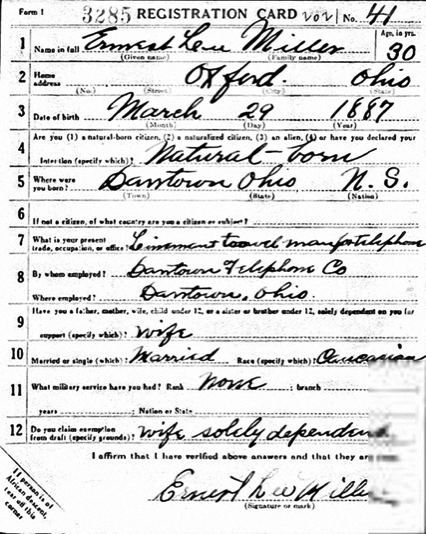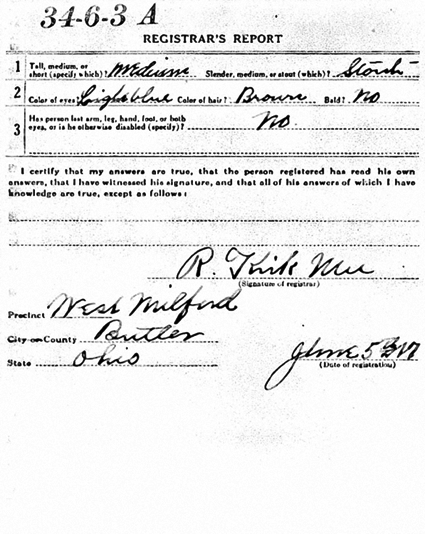


FAMILIES M-P: MILLER LA ~ Lewis A. Miller
Lewis A. Miller (aka "L.A." MIller)
Diaries -excerpts
1. Why use excerpts?
2. Which excerpts to use?
Louis A. Miller wrote something in his diaries on EACH and EVERY DAY, from, at least, 1900 through 1937. He recorded events from his personal life and frequently reported local, state, national, and world events. He also noted each day's weather, including the morning, mid-day, and evening temperatures. It is difficult to replicate Mr. Miller's entire set of diaries at this website.
Excerpts, of any work, are highly subjective. What should be chosen? What should be omitted? The L. A. Miller diary excerpts, chosen for their presumed interest to persons who are interested in the history of Darrtown during the mid-20th century, are available through the links below.

Viewing the excerpts...
When you click a link for any year (at the right), the excerpt will appear in a separate page.
LINKS TO DIARY EXCERPTS
EXCERPTS ORGANIZED BY YEARS...
EXCERPTS ORGANIZED BY TOPICS...
This section provides extra information about some specific topics addressed in Mr. L. A. Miller's diaries.
TOPIC 1: The Great Miami River Flood of 1913
Unknown to him at the time, Mr. Miller's March 25, 1913 journal entry (below, left) was a precursor to one of the worst natural disasters in the history of the Miami Valley ... the "Great Flood of 1913."

Webmaster Note: In his diary entry, at the left, Mr. Miller cites the height of waters in the "Talawanda." That stream is actually the Four Mile Creek, which begins in Preble County (Ohio), about halfway between Boston, Indiana and Eaton, Ohio. From that most northern point, the Four Mile Creek flows southward, passing just east of Oxford, Ohio. It continues southeastward, flowing about 1/4 mile south of Darrtown, and finally empties into the Great Miami River just north of the Hamilton City limits near North "B" Street.
It seems likely that Mr. Miller, and others throughout the Greater Miami Valley, anticipated that the rainfall would cease by the second day, Wednesday, March 26.
Sadly, it was not to be.

For a three day period (March 25-27), 8–11 inches of rain fell throughout the Great Miami River watershed, on already saturated soil, resulting in more than 90 percent runoff that caused area rivers and tributaries to overflow.
Currently, we do not possess any images from Darrtown that portray the infamous flood of 1913. However, images found at the "We're from Hamilton, Ohio" Facebook page illustrate the extent of the flood damage in Hamilton, Ohio, located about seven miles southeast of Darrtown. Click the following link to access images of the 1913 Flood of Hamilton, Ohio.
The topics include:
TOPIC 2: World War I registration for the military draft (1917, June 05)
In response to the news that the United States would engage troops in World War I, Mr. Miller wrote an entry in his diary about the requirement that all men, between the ages of 21 & 31, register for the military draft. HIs note included this sentence:
"Our only son and living child is in his 31st year & therefore had to register."
A copy of the registration card for Ernest Miller, son of L. A. Miller, was found at Ancestry.com. The registration card confirms Ernest Miller's middle name as "Lee" and his date of birth as March 29, 1887.


Front of registration card
Back of registration card

TOPIC 3: Amateur Baseball - A chronicle of "country ball," as played by Darrtown boys
Currently, the reported seasons range from 1919 through 1923; more records will be added, as they become available.
Click the following link to access: Amateur Baseball - A chronicle of "country ball," as played by the Darrtown boys.
The list that appears at the link below represents an attempt to summarize how the Darrtown baseball teams performed through the years. At this time (February 2017), the earliest source of information is the collection of personal diaries written by Darrtown resident, L.A. Miller.
Direct quotes regarding games and scores have been excerpted from the daily diaries of Mr. L.A. Miller – for the years that are listed. As more records are found, they will be added here.
While Mr. Miller's notes represent the best records that we possess, there are some limitations that need to be acknowledged: The records are anecdotal and they lack the credibility that is usually associated with printed newspaper accounts.
These are the only known records of games played by Darrtown teams. L.A MIller does not slant his notes in favor of Darrtown. If he thinks the local boys played poorly, he notes the shoddy play with plain-spoken language.
TOPIC 4: Horsepower - from four legs to four wheels
Many times in his daily journals, L. A. Miller refers to travel, as he routinely ventured beyond Darrtown to conduct business, attend social and political events, and visit with friends and family. His mode of transportation included horse-drawn vehicles, trains powered by electric and steam, and automobiles driven by combustible engines.
Click the following link to read about Mr. Miller's experiences, as he, along with his peers, made a transition in horsepower, from live to mechanical ... and view images that depict a remarkable change in American transportation at: Horsepower.



THE MILLER DIARIES COVER THE YEARS BETWEEN 1900 AND 1937.
UNLESS OTHER MILLER DIARIES ARE DISCOVERED, THE 1937 DIARY IS THE FINAL DIARY IN THE SERIES.
Mr. L.A. Miller, a longtime resident of Darrtown, Ohio, wrote an entry in his journal on each day of the year. The entries that appear at this website were selected and excerpted, because they reference Darrtown people, places, and events and portray life, as it occurred during Mr. Miller's lifetime.
Within the excerpts, clarifying comments have been added to some diary entries, on the assumption that Mr. Miller’s terms, colloquial expressions, and/or references, may lose their meaning, with the passage of time. Most terms and/or references are clarified when they first appear in the collection of Mr. Miller’s diaries and not addressed thereafter. Consequently, the L. A. Miller diaries are better understood, if one reads them in chronological order.
● A question mark within brackets [?], indicates that a word or phrase in the diary was illegible.
● The word “sic” within brackets [sic], indicates that a quoted word or phrase that seems odd or erroneous has been quoted and/or spelled exactly as it appears in the original.
● Content in UPPERCASE font, indicates explanatory notes written by the person who excerpted the diary.
If you can offer additional clarification, please contact the Darrtown.com webmaster.
Two questions about excerpts...


